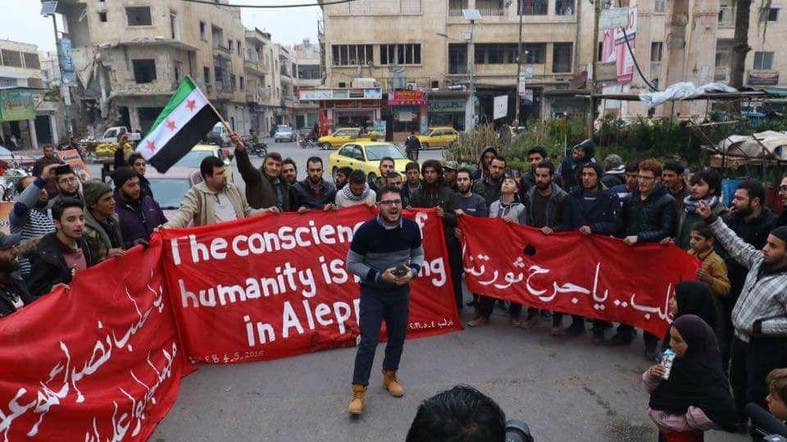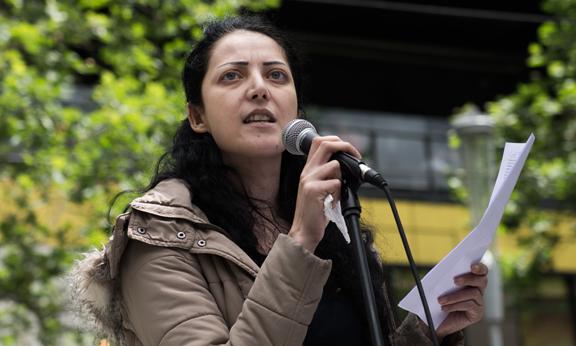 'Nurse Khaled Naanaa, 31 stands at Kings Park lookout in Perth, Western Australia, staring out at the Swan River. "To me, Australia is like heaven on Earth," Mr Naanaa said. "Not long ago I was under barrel bombings, snipers' shootings, amputating people's legs. I've gone from hell to heaven. It's an amazing feeling."
'Nurse Khaled Naanaa, 31 stands at Kings Park lookout in Perth, Western Australia, staring out at the Swan River. "To me, Australia is like heaven on Earth," Mr Naanaa said. "Not long ago I was under barrel bombings, snipers' shootings, amputating people's legs. I've gone from hell to heaven. It's an amazing feeling."
Nine months earlier he had been trapped inside the besieged town of Madaya, Syria, running the only medical clinic in a town where children were slowly being starved to death. It is only now that Mr Naanaa and his wife and daughter are safe, as newly arrived refugees in Australia, that he can tell the full story of what happened in Madaya.
"One day when the Bashar al-Assad Government falls, this documentation of war crimes will be used to indict them in the courts of The Hague."
Mr Naanaa grew up in the Syrian capital Damascus, where he studied nursing at university. After graduating, he spent much of his career working as a surgical and anaesthesia nurse at government hospitals.
Late one evening in April 2011 he was on duty at Tishreen military hospital when a busload of injured protesters was brought through the hospital gates. An uprising against Mr Assad's rule had begun two months earlier, and now unarmed protesters had been shot in the streets by regime troops. But hospitals were no safehaven. To Mr Naanaa's horror, instead of treating the wounded, his colleagues began to beat and torture the injured demonstrators.
Mr Naanaa refused to join in, and instead became part of a secret underground medical network in Damascus, treating wounded opposition supporters across the capital.
"We treated people away from the eyes of the regime, it could have been in a kitchen, in a bedroom, in any place. This job was done very secretly, I didn't tell my family even."
In 2012, Mr Naanaa moved to the opposition-held town of Madaya, a mountainous village about 40 kilometres from Damascus and close to the Lebanese border. There he helped set up a medical clinic and makeshift surgical theatre, assisted by a young dentistry student and a vet.
"During those years it was all happening. Shelling every day, barrel bombs, daily massacres. I always had emergency cases to take care of," Mr Naanaa said.
He taught himself how to perform surgeries by watching YouTube videos.
"I used to have to look things up, in medical guides or watch on YouTube," Mr Naanaa said.
As the most qualified medical practitioner in the town, the young nurse became "Dr Khaled" to the 40,000 residents of Madaya. In July 2015, the situation in Madaya took a dramatic turn for the worse. The rebel-held town became completely besieged by the Syrian Government and its ally, the Lebanese Shiite militia group Hezbollah. Access to and from the town was blocked.
"They began planting landmines, sniping, watch towers, the situation became impossible for anyone to be able to leave Madaya," Mr Naanaa said. "During July it became a 100 per cent siege, it was impossible to allow in even a grain of wheat … There was no baby milk, no food, no drinks, nothing."
A United Nations convoy of food arrived in Madaya in early October but it lasted only a few weeks, and soon hunger set in again. Like the rest of the town, Mr Naanaa was existing on only one meal a day — lentils or rice soup. Mr Naanaa was weak and dizzy from a lack of food, but his workload intensified as an increasing number of townspeople tried to escape Madaya.
"We had so many amputation cases because of the landmines surrounding the town and the many people who tried to break the siege."
Mr Naanaa said he appealed to the United Nations (UN) and Red Cross offices in Damascus, asking for aid to be urgently delivered to Madaya.
"We tried to communicate with so many people but this didn't help at all. We were told they needed the agreement of the Syrian regime," he said. "People started to look pale, even their cheeks started to dissolve. They were getting so thin, even starting to look like skeletons."
Five months into the siege the first victim, a three-month-old baby, died of starvation.
"We made so many calls to the UN offices. We told them, 'people are dying of starvation, you must help save them'. They didn't give us any real promises," he said.
Mr Naanaa's patients continued to die. "I will never forget the looks on the children's faces," he said.
"It was the happiest day of my life, I don't think we'll ever experience such happiness again, me and all the people of Madaya," Mr Naanaa said.
Supporters of Mr Assad had accused the Madaya medical staff of faking the videos of starving, emaciated children Mr Naanaa had filmed and sent to ABC. Mr Naanaa was determined to show the UN representatives that the situation was real.
Mr Naanaa led the UN and Red Cross workers into his clinic, where the most malnourished patients lay on the floor in various stages of illness and distress.
"They all started to cry, all the delegation, when they saw kids, the women, the older people, even young men lying on the floor," Mr Naanaa said.
"Skinny people, skeletons, skin attached to the bones, nothing in-between. Then the talk ended. No more questions were asked."
After exposing the use of the Syrian regime's starvation tactics to the world, Mr Naanaa received death threats.
On a snowy, freezing night in January this year he managed to escape from Madaya, and after walking through mined fields for two nights he crossed the Lebanese border.
But I didn't want to leave. I never wished to leave Syria. But at the end this was not my choice, I was forced to leave, I was facing death."
The hardest part for Mr Naanaa is that, despite everything he risked to tell the world about the deliberate starvation of people in Madaya, the siege continues. And despite intermittent UN convoys, many more people have starved to death inside the town. The Madaya medical clinic has now also been suspended due to a lack of resources and staff.
"When I eat and drink, I ask myself, how the people in Madaya are living?", Mr Naanaa said. "How are the patients? Is there someone who needs my help? These questions are on my mind all the time, not only every day but also every minute every hour." '








